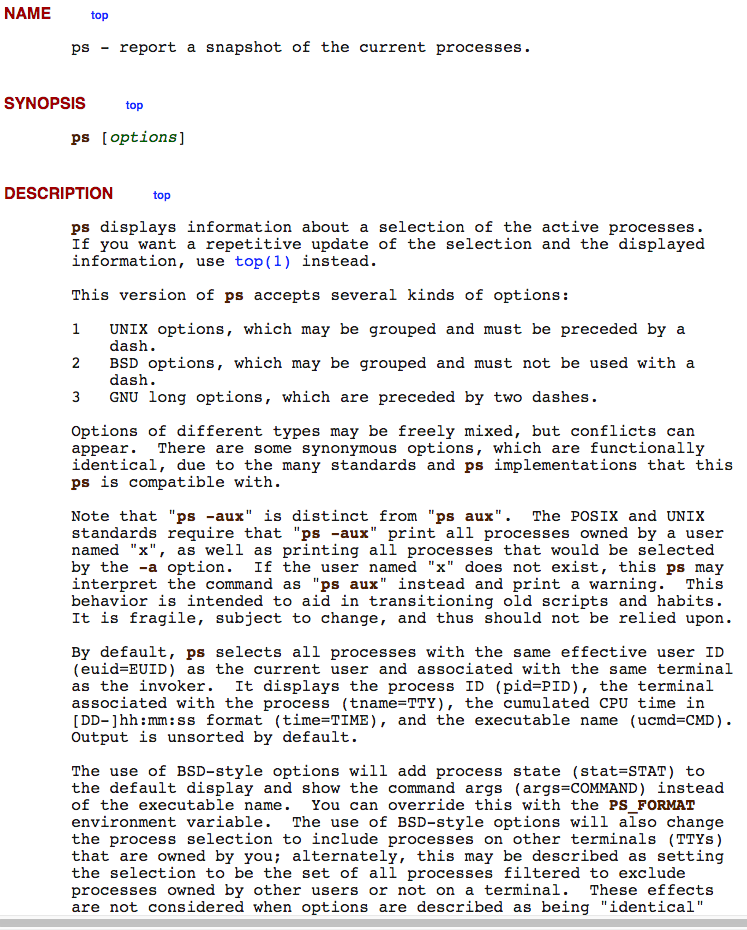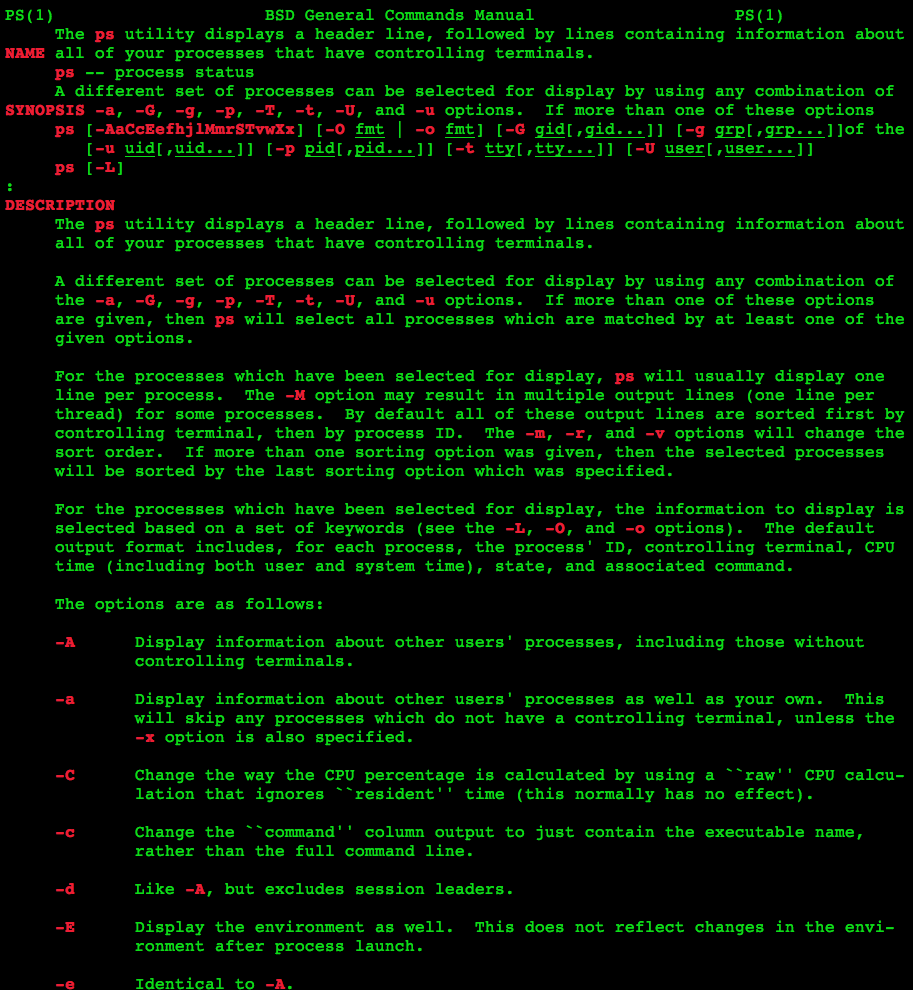Why Unix Shell Syntax Sucks
Bad Designs of Unix Shell Syntax and Semantics
- Ambiguity of Parameter Names
- Inconsistent Parameter Names
- Inconsistent Semantics of Repeated Parameters
- Complex Relation of Parameters
- Inconsistency of Boolean Parameter Syntax
- Inconsistency of Parameter Value Syntax
Ambiguity of Parameter Names
arguments are given with a dash prefix. Example
ls -a -l
Order does not matter (USUALLY!!). So,
ls -a -l
is the same as
ls -l -a
but arguments can be combined, example
ls -al
means the same thing as
ls -a -l
However, some option consists of more than one character. example
perl -version perl -help
therefore, the meaning of a option string "-ab" is ad hoc dependent on the program. It can mean two parameters “a” and “b”, or just one parameter named "ab".
Inconsistent Parameter Names
often there are two versions of the same optional argument. example
perl -help perl -h
perl -version perl -v
this equivalence is dependent for each program.
Different program will disagree on common options. For example, to get the version, here are common varieties:
-v-V-version
sometimes v/V stands for "verbose mode", i.e. to output more detail.
Inconsistent Semantics of Repeated Parameters
Sometimes, if a option is given more than once, then it specifies a degree of that option. For example, some command accept the -v for "verbose", meaning that it will output more detail. Sometimes there are few levels of detail. The number of times a option is given determines the level of detail. , for example: on Solaris 8,
/usr/ucb/ps -w /usr/ucb/ps -w -w
Thus, meaning of repeated option may have special meaning depending on the program.
Complex Relation of Parameters
Oftentimes some options automatically turn on or surpress a bunch of others. For example, Solaris 8,
/usr/bin/ls -f
Inconsistency of Boolean Parameter Syntax
When a named optional parameter is of a boolean type, that is a toggle of yes/no, true/false, then, often, instead of taking a boolean value, their sole existence or non-existence define their value. (this is a confusion/infusion of named parameter and optional parameter)
Toggle options are sometimes represented by one option name for yes, while another option name for no. And, when both are present, the behavior is program dependent.
Inconsistency of Parameter Value Syntax
For named options, the syntax for arguments is inconsistent. Some program uses one syntax variation, others require another, some accept more than one syntax variations, for others it's syntax error. example
command -o="3"command -o3command -o 3
Often one option may have many synonyms.
Examples of Better Design
A example of a better design… (Mathematica, Scheme, Dylan, Python, Ruby… there's quite a lot elegance and practicality yet distinct designs and purposes and styles …)
(recall that unix is a bad design to begin with; it's a donkey shit pile from the beginning and continuation. Again, unix is not simply technically incompetent. If that, then that's easy to improve, and i don't have a problem with, since there are things in one way or another considered horrendous by today's standard like COBOL or FORTRAN or DOS etc. But, unix is a brain-washing idiot-making machine, churning out piles and piles of religiously idiotic and pigheaded keyboard punchers. For EVERY aspects of good engineering methodology improvement or language design progress opportunity, unixers will unanimously turn it down.)
Inevitably someone will ask what's my point. My point in my series of unix-showcasing articles have always been clear for those who study it: Unix is a crime that caused society inordinate harm, and i want unix geeks to wake up and realize it.
above is originall posted to a Mac OS X mailing list. [Source http://www.omnigroup.com/mailman/archive/macosx-talk/2002-June/066077.html ]
- From: xah@xahlee.org
- Subject: unix inanity: shell env syntax
- Date: June 7, 2002 12:00:29 AM PDT
- To: macosx-talk@omnigroup.com
Unix Shell Syntax Idiocy Example: ps Command
One good example of the confuse ball in a single command can be seen in the ps command.
In Solaris and BSD, typically you type ps auwwx (note, dash not allowed.) In POSIX unix, you type ps -ef.
In linux, it tries to merge both syntax.
See man ps.


Unix Shell Syntax History
Microsoft PowerShell
Note: Microsoft's new shell programing language, PowerShell (), adopted much of unix shell's syntax and the pipe paradigm, but with consistent design.
Unix Shell
Why UNIX sucks series
- The Unix-Haters Handbook
- The Nature of the Unix Philosophy (2006)
- Origin of Unix Pipe (2010)
- Do Unix Tools Do One Thing Well
- Why Unix Man Page Sucks
- Why Unix Shell Syntax Sucks
- Why Bash Sucks (2022)
- Origin of Unix Dot File Names (Rob Pike. 2012)
- UNIX Philosophy, Fast Food the UNIX way
- On Unix File System's Case Sensitivity (2001)
- On Unix Filename Characters Problem (2008)
- Unix and the mbox Email Format (2002)
- Unix, RFC, Line Truncation (2002)
- The X-Windows Disaster (X11) (1994. Don Hopkins)
- The Unix Pestilence (2003)